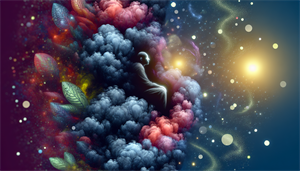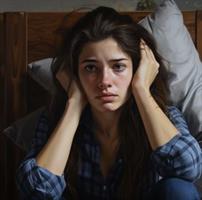Exploring the Intersection of Sleep Apnea and Night Sweats
Sleep apnea, a sleep disorder characterized by repeated cessation of breathing during sleep, often contributes to the occurrence of excessive sweating at night. Indeed, around 30% of male patients with Obstructive Sleep Apnea (OSA) report night sweats, which can result in excessive daytime fatigue.
This connection between sleep apnea and night sweats highlights the importance of being aware of various medical conditions and their potential symptoms. This association comes from the release of stress hormones during sleep apnea events, leading to increased body temperature and, consequently, experiencing night sweats.
The Role of Obstructive Sleep Apnea in Nighttime Sweating
Obstructive Sleep Apnea (OSA), a type of sleep apnea, is particularly notorious for causing nighttime sweating. This disorder is characterized by the obstruction of airways during sleep leading to repeated cessation of breathing throughout the night. These breathing interruptions, coupled with the body’s stress responses, contribute significantly to night sweats.
Stress Hormones and Their Impact on Body Temperature
During an apnea episode, stress hormones are released, potentially elevating the body’s temperature. This increase in temperature can result in sweating, hence the connection between sleep apnea and night sweats.
This process is triggered by frequent arousals during the night, which are caused by interruptions in breathing, affecting melatonin secretion due to exposure to abnormal nocturnal light and untreated conditions leading to increased blood sugar and fat levels as well as elevated blood pressure.
Unveiling Symptoms: When Night Sweats Signal a Deeper Issue
Night sweats can be a tell-tale sign of underlying health issues, such as sleep apnea. Should you manifest symptoms of sleep apnea and night sweats, it becomes necessary to seek medical advice and investigate suitable treatment options without delay. While night sweats alone do not confirm a diagnosis of sleep apnea, the presence of other symptoms can provide a clearer picture of the condition.
The Symptom Spectrum of Obstructive Sleep Apnea
Obstructive Sleep Apnea (OSA) presents a range of symptoms, including snoring, choking, headaches, and excessive dry mouth. Snoring, often associated with OSA, coupled with additional symptoms such as gasping or choking during sleep, could signal the presence of OSA or gastroesophageal reflux disease.
These choking episodes result from the partial or complete blockage of the airway, leading to breathing pauses and a subsequent drop in oxygen levels in the blood, prompting the individual to wake up choking or gasping for air. Headaches, another common symptom, may be attributed to oxygen desaturation leading to cerebral vasodilation. In individuals with OSA, the prevalence of sleep apnea headache is between 12%-18%.



